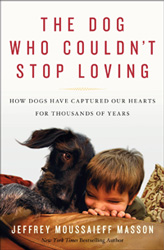Editorial
Front Page - Friday, November 19, 2010
The Bookworm
“The Dog Who Couldn’t Stop Loving”
Terri Schlichenmeyer

There’s a wolf at your door. Eh, more or less.
He looks like a wolf, anyhow, but not quite. He has large teeth and a wolfish body, but he barks and wolves don’t. He will look you in the face and not mean it as a threat. And he has a large capacity to love you, unlike wild canids.
But why do you have that kind of relationship with your dog and not with, say, pigs or sheep? In his new book The Dog Who Couldn’t Stop Loving by Jeffrey Moussaieff Masson, you’ll learn more about the heart of the wolf at your feet.
At two years old, Benjy the Lab was on his third home. A guide dog school drop-out, he’d also failed seizure-dog training because he hated going for walks and balked at most lessons. That wouldn’t do for a service dog, and Benjy was up for adoption again.
Though he wasn’t looking for a dog, Jeffrey Moussaieff Masson agreed, at the urging of his sons, to see Benjy. The dog was polite at that first meeting, but Masson was “disappointed” that he refused to obey.
Still, his foster parents (and everybody who met Benjy) remarked on his loving personality. Benjy never met a stranger; indeed, he adored Masson’s kids the minute he saw them. He even befriended animals of other species.
Observing Benjy and his loving nature got Masson thinking: why, among domesticated creatures, do dogs love us the way they do? Why dogs and not cats, cows, or camels? And how does a dog’s love affect us? Are we more human because of it?
Scanning through history, Masson came to the conclusion that, without dogs, human society would be less civilized. By taming wolves and allowing them to become dogs that love us unconditionally, humankind made the hunt easier; the burden lighter; the home safer; and life, more of a pleasure.
But what about societies that seem to despise dogs? How did they evolve without canine cuddles? Is there something special about this inter-species affection? And do service dogs love us or are they, as some assert, mere “slaves”?
Though at times a little over-generalized (not all canines enjoy walks or other canines), The Dog Who Couldn’t Stop Loving is a fine examination of the deep relationship between us, our fur-kids and other people our dogs may adore.
What I found most intriguing about this book, though, runs deeper. Masson brings up points that most dog lovers haven’t (or couldn’t bear to) consider: that the loving nature of dogs, for instance, allows them to transfer their attachment to another human easily and permanently, and that the balance of love is unbalanced. About twenty humans are killed each year by dogs, while we kill “several million” dogs in the same amount of time.
If you share your home with a wolf of any size, this love letter to the loving nature of him and his kin is a real treat. The Dog Who Couldn’t Stop Loving is a howling good read.
|
|